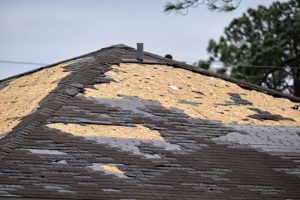 Discovering roof damage after a fierce storm is never a pleasant experience. And let’s be honest, dealing with insurance companies to get it fixed can be even less enjoyable.
Discovering roof damage after a fierce storm is never a pleasant experience. And let’s be honest, dealing with insurance companies to get it fixed can be even less enjoyable.
Some homeowners might be tempted to avoid the whole process altogether, and I can understand why. However, let’s pause for a moment and think about it. After all, why pay for insurance if you’re not going to use it? Before making a decision, let’s have a conversation about it.
Our roofing experts believe in providing honest and clear advice on managing roof damage insurance claims. So, let’s break down whether you should file a claim for roof damage in Keller TX.
Should You File an Insurance Claim for Roof Damage?
Absolutely, yes, you should file an insurance claim for roof damage. After all, you’ve been faithfully paying your insurance premiums for moments like these. However, it’s essential to file a claim only if extreme weather or a storm event is the cause of your roof damage.
Insurance typically covers roof damage caused by straight-line winds during severe thunderstorms, hail storms, and tornadoes. In general, policies cover damage from fallen trees during storms. If any of these factors caused the roof damage, homeowner’s insurance must cover the cost of a roof replacement.
Keep in mind that the adjuster’s inspection will determine whether there’s enough roof damage to warrant a full roof replacement in Keller TX. As long as extreme weather caused the roof damage, it’s a wise choice to file an insurance claim. Ultimately, though, the decision is entirely yours.
Things to Know Before Filing a Roof Damage Insurance Claim
Now that you’ve decided to file a claim for roof damage, there are some crucial factors to consider:
1. Check Your Insurance Policy
Your roof is covered by homeowners insurance, but the specifics of your policy determine the payout you’ll receive. Check your policy as soon as you suspect roof damage. Your policy will either be an Actual Cash Value (ACV) policy or a Replacement Cost Value (RCV) policy.
 An ACV policy provides compensation for the depreciated value of your roof. With this policy, your insurance pays for what your roof is worth today. In contrast, an RCV policy covers the cost of replacing your entire roof, or at least a significant portion of it.
An ACV policy provides compensation for the depreciated value of your roof. With this policy, your insurance pays for what your roof is worth today. In contrast, an RCV policy covers the cost of replacing your entire roof, or at least a significant portion of it.
You’ll receive an initial check for the actual cash value, while the insurance company withholds the recoverable depreciation. Once you complete the roof replacement, provide proof, and your insurance company sends a second check for the remaining amount.
However, if you don’t have the work done, you won’t receive the second check. While both policies protect your roof, an RCV policy ensures you get the most out of your premiums.
2. Understand the Costs Involved
Once your claim is approved, you’ll need to pay your deductible. Additionally, if the insurance company’s payout doesn’t cover the full replacement cost, you’ll be responsible for the difference.
Many homeowners take this opportunity to upgrade their roofs, as insurance covers the majority of the cost. However, if the insurance payout fully covers the replacement, you’ll only need to pay your deductible to get a brand-new version of your current roof.
3. Depend on Your Insurance Adjuster
As soon as you suspect roof damage, contact your insurance company. They will either send an adjuster or instruct you to call a roofing contractor for an inspection. While a roofing contractor can assess storm damage and document proof, the insurance adjuster has the final say on your claim.
4. Be Prepared for Possible Denial
Keep in mind that your insurance claim for roof damage may be denied for various reasons, including improper roof installation, inadequate attic ventilation, delayed filing, or policy exclusions. If your initial claim is denied, don’t panic.
You can explore options such as requesting a different adjuster for a second opinion or involving a structural engineer to inspect and provide evidence. As a last resort, legal action is possible but should be considered only in extreme cases, as it can be costly.
 5. Multiple Quotes Are Unnecessary
5. Multiple Quotes Are Unnecessary
While seeking multiple quotes is a good practice for choosing a residential roofer, it’s unnecessary when dealing with insurance claims. Insurance companies determine the amount based on software like Xactimate, which calculates prices based on regional material averages.
However, it often excludes overhead and profit, among other essential factors. As a result, a roofing contractor’s estimate may exceed the insurance company’s initial estimate. If this happens, you can supplement the claim to receive the full amount owed.
But remember that the lowest estimate doesn’t guarantee quality workmanship or a reliable warranty for future issues. It’s crucial to choose a trusted roofing company, not just the cheapest one.
How to Hire a Roofing Contractor for an Insurance Claim
Now that you’re aware of these five considerations, it’s time to decide whether filing a claim is the right move. If you choose to proceed, the first step is to contact your insurance company.
Regardless of their instructions, it’s your responsibility to find a reputable roofing contractor like Restoration Roofing TX. Insurance work can attract less scrupulous contractors, and scams are not uncommon.
If you’re looking for a trustworthy contractor, call Restoration Roofing TX now. We’ll help fix your roof damage.
Like our Facebook page for more great info about roofing services.
Restoration Roofing TX
Keller, TX 76248
817-717-6220
http://170.249.236.124/~restorationroofi
info@restorationroofingtx.com
Fort Worth, TX 76102
682-255-1550
https://restorationroofingtx.com/areas-served/fort-worth-roofing-contractors/
Serving: Fort Worth, Keller TX, Denton County TX, Tarrant County, Arlington TX, North Richland Hills TX, Roanoke TX, Hurst TX, Southlake TX, Grapevine TX, Flower Mound TX, Haltom City TX, Bedford and Haslet TX, Colleyville TX, Denton TX, Lewisville TX, Euless TX, Grand Prairie TX, Azle TX

